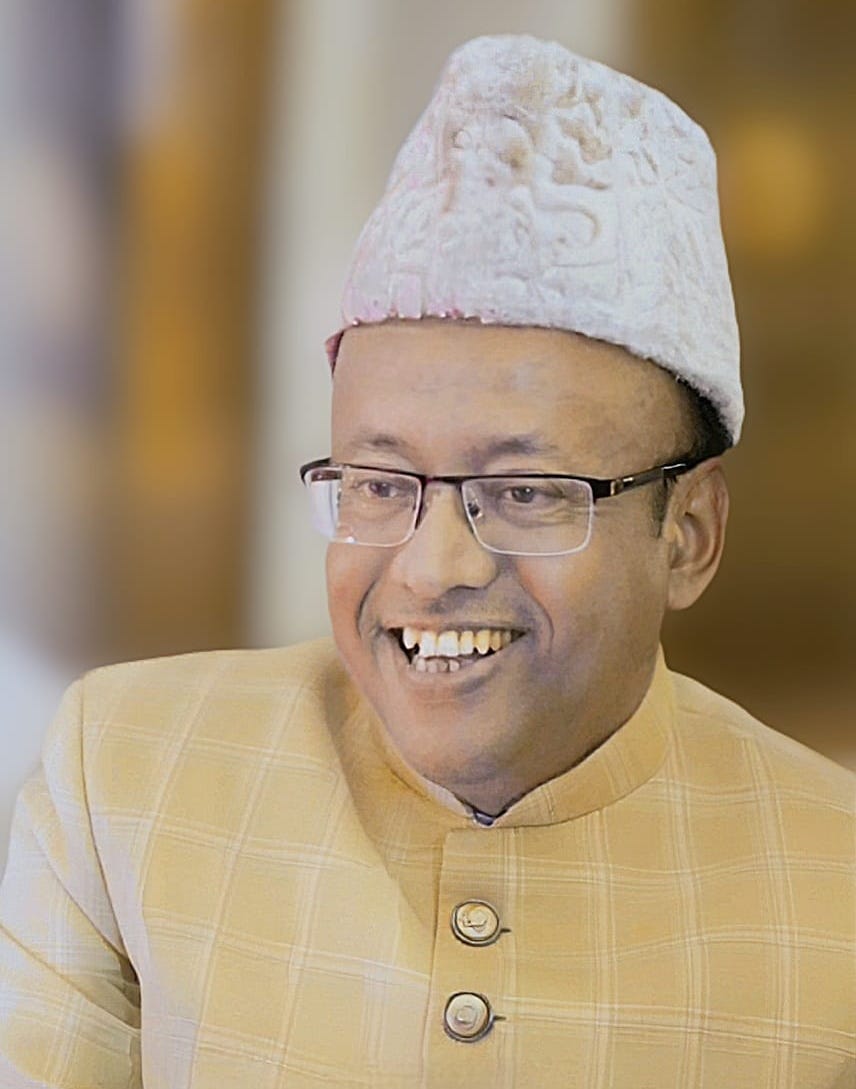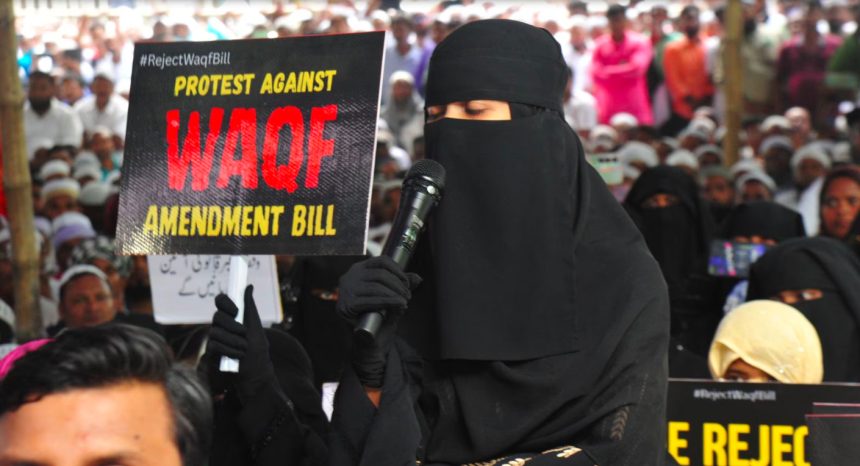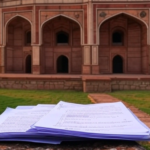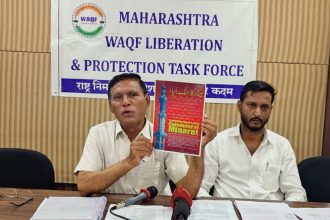This is the second interview in our BeyondHeadlines Waqf Interview Series. In today’s issue, we spoke with Dr. Ahmed Mohiuddin Siddiqui, a seasoned journalist and political analyst currently based in the Gulf.
 Originally from Hyderabad, India, Dr. Ahmed brings over three decades of experience in journalism, including 30 years of dedicated reporting on Waqf issues. He began his career as a sub-editor and staff reporter at Deccan Chronicle, a major English-language newspaper in India.
Originally from Hyderabad, India, Dr. Ahmed brings over three decades of experience in journalism, including 30 years of dedicated reporting on Waqf issues. He began his career as a sub-editor and staff reporter at Deccan Chronicle, a major English-language newspaper in India.
Over the years, Dr. Ahmed has established himself as a prominent voice in Middle Eastern political commentary, notably appearing on Oman TV as a political analyst until recently. His articles and reports have been published across the globe — from cities like Hyderabad, Ahmedabad, New Delhi, and Guwahati in India, to international locations such as London, Muscat, Tunis, Rabat, Kyiv, Kuala Lumpur, and Lilongwe.
A significant focus of his work has been the Waqf system in India. He has written extensively on the subject, earning recognition from writers and journalists in the Netherlands and Germany, including citations in German-language publications. Notably, acclaimed historian Jamal Malik referenced Dr. Ahmed’s research in his book Islam in South Asia: A Short History, published in the Netherlands. Dr. Ahmed holds a Ph.D. in English Literature from Osmania University.
Here are some highlights from BeyondHeadlines’ exclusive conversation with Dr. Ahmed Mohiuddin Siddiqui:
You’ve been in journalism for a long time and have closely followed issues concerning the Muslim community in India. How do you assess the approach of Muslims, particularly Muslim organizations, toward the Waqf issues?
For the past 30 years, since beginning my journalistic journey at The Deccan Chronicle, covering both political and Waqf-related affairs, I have observed with deep concern how the Muslim community and its institutions have failed to effectively safeguard Waqf properties. This failure stems largely from internal disunity, personal vested interests, and systemic political interference.
Across India, Waqf Board chairpersons and members are frequently political appointees, often chosen based on party loyalty rather than merit or dedication to Waqf principles. Their allegiance lies not with Allah, the divine custodian of Waqf, but with the leaders of the political parties that grant them their positions. These appointees are well aware that defying the party line or state leadership could cost them their post overnight. In many cases, corrupt practices among board members and employees have directly contributed to the decline of Waqf institutions.
Waqf properties, meant to serve the socio-economic and religious needs of the Muslim community, have been systematically alienated and transferred to industrialists and developers. In states like Andhra Pradesh and Telangana, high-profile leaders such as N. Chandrababu Naidu and K. Chandrasekhar Rao (KCR) have allegedly handed over vast Waqf lands—worth thousands of crores—for major infrastructure projects like Hyderabad Airport, HiTech City, and Lanco. One notable example is the Hazrat Hussain Shah Wali Dargah lands, valued at over ₹1 lakh crore, which were seized with minimal resistance from the Muslim political leadership. Instead of mobilizing protests or legal challenges, alliances were made with ruling parties in exchange for political favors such as MLC seats or municipal contracts.
From within the Waqf Boards themselves, certain Muslim political figures have facilitated the transfer of Waqf lands to favored developers, often for negligible amounts. Legal professionals, hired to defend these properties, have reportedly accepted large fees only to collude with opposing parties and deliberately lose cases.
One particularly disturbing allegation involves the Telangana Waqf Board under KCR’s administration, where access to the Record Room—housing critical property documents—was obstructed, reportedly to prevent legal defense in court. Former Deputy CEO Dr. Mohammed Safiullah made several attempts to unlock the Record Room, occasionally succeeding, but most of the time it remained sealed. Although he filed 133 FIRs related to Waqf land encroachments, these cases saw no follow-up post-2021, and no new FIRs have reportedly been filed since.
Meanwhile, the Modi government has claimed that Waqf Boards are illegitimately asserting rights over temple lands—a narrative that obscures the reality that many Waqf properties are being encroached upon, with unauthorized structures, including temples, being erected to create irreversible changes on the ground. The case of the Moin Manzil property in Hyderabad—2,000 square yards fraudulently acquired by a builder through the alleged bribery of Waqf officials—illustrates the pattern.
The government claims that the Waqf Act 2025 has been introduced for the welfare of Muslims. If that is the case, where does the problem lie? In your view, how and why could this Act pose a threat to the interests of the Muslim community?
This claim that the Waqf Amendment Act has been introduced for the welfare of Muslims is completely unfounded and misleading. In response to your question about where the root of the problem lies, it must be said clearly: responsibility rests both with the current Modi government and with sections of the Muslim community itself. The central government appears intent on appropriating Waqf properties—lands historically endowed for the welfare of the Muslim community—under the pretext of reform. These properties are increasingly being handed over to industrial entities and groups aligned with Hindutva ideology.
There is a growing fear that the Modi government is pursuing a strategy of economic marginalization of Muslims. This appears to be occurring alongside a wider pattern of communal unrest, including riots and lynchings allegedly incited by extremist elements. Over the past decade, numerous historical mosques and Dargahs associated with Sufi saints have been destroyed in BJP-ruled states such as Delhi, Uttar Pradesh, Gujarat, and Uttarakhand. For instance, just last month, a more than 100-year-old Dargah located on the premises of Dehradun Hospital was demolished under the guise of removing “encroachments.” Even Shadab Shams, Chairman of the Uttarakhand Waqf Board and a BJP appointee, condemned the demolition in a letter to Chief Minister Pushkar Singh Dhami. However, expectations of justice are low given Dhami’s well-documented anti-Muslim positions and recent efforts to shut down or regulate madrasas in Uttarakhand—the only Indian state where the Uniform Civil Code (UCC) has been implemented so far.
This pattern is not new. As Chief Minister of Gujarat, Narendra Modi reportedly oversaw the demolition of the tomb of Hazrat Wali Gujarati, a revered Sufi saint and poet. Today, a road median runs over what was once a sacred site in Ahmedabad. The broader Muslim community, unfortunately, failed to mount a substantial resistance to such actions, and those who did attempt to protest were often silenced with force.
The Waqf Amendment Act poses a severe threat to the socio-economic foundation of India’s Muslims. This concern is shared not only by political leaders but also by scholars, journalists, academics, and civil society members. Waqf properties, valued in crores of rupees, risk being taken from their rightful beneficiaries and handed over to external parties, deepening the already existing economic disparities.
In your opinion, what steps should Muslims, particularly the youth, take in response to the current situation?
In light of the ongoing concerns surrounding the Waqf Amendment Act, it is imperative that the Muslim community, especially its youth, responds with unity, strategy, and peaceful resistance.
It is essential that the community remains vigilant and does not succumb to provocations, particularly from those who historically aligned with colonial forces and failed to uphold India’s national symbols for decades. Any protests must be conducted with discipline and restraint. Private meetings and strategic planning sessions should be prioritized to minimize the risk of infiltration by violent extremist elements.
The Sikh and Jat communities have already demonstrated how sustained and nonviolent resistance can compel even the most resolute governments to retreat. Their resilience is a model worth emulating as the Muslim community prepares to counter the implications of this Act.
Internal reform is equally necessary. The community must guard against the influence of political opportunists and pseudo-leaders who exploit religious causes for personal or organizational gain. At its core, the Waqf Amendment Act appears to be part of a broader strategy to marginalize Muslims economically, what some observers are calling “economic genocide.”
The government must be held accountable for misleading the public. For instance, it submitted a questionable affidavit to the Supreme Court claiming that Waqf properties have nearly doubled since 2013. It also falsely claimed in Parliament that Waqf systems do not exist in Muslim-majority countries like Türkiye—a claim refuted by journalist Afroz Alam Sahil, who highlighted Turkey’s robust and modern Waqf Bank as a counterexample. India would do well to study and consider similar institutional models.
Legal recourse remains a vital path, though it may be long and arduous. Confidence in the judiciary has been undermined by controversial judgments and appointments, including the legacies of justices like Ranjan Gogoi, Abdul Nazeer, Sharad Bobde, and D.Y. Chandrachud, whose perceived ideological leanings have raised questions about impartiality. The soon-to-be Chief Justice of India, B.R. Gavai, has previously sided with the government, as seen in the unanimous verdict supporting the abrogation of Article 370 in Kashmir. Meanwhile, public statements and attacks on the judiciary by high-ranking officials like Vice President Jagdeep Dhankar and MP Nishikant Dubey reflect a troubling erosion of democratic norms.
In this climate, Muslims must remain patient and committed to a constitutional path. Building alliances with India’s true Sanatani Hindu brothers and sisters, who embody the values of peace, tolerance, and pluralism rooted in millennia of Indian civilization, is essential. The strength of this shared heritage must not be forgotten.
Above all, humanity must prevail—and be preserved at all costs.










Ma sha Allah , well appraised . Very nicely summarised .
Nicely presented the facts and the problems within the community and outside as well. Charity begins at home, but here, can we say “hum hi dushman toh nahiN hai apne” on top of sarkaar who has been in a minority demolition mode 🙁